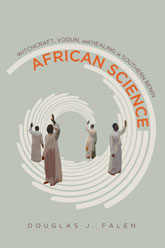|
African Science
Witchcraft, Vodun, and Healing in Southern Benin
Douglas J. Falen
“A stunning achievement in the anthropology of religion. Weaving together narrative and analysis, Falen provides a gripping account of the imponderables that constitute the occult in Benin. He demonstrates how African science can refine our comprehension of fidelity and betrayal, health and illness, science and religion, and life and death—the philosophical themes that define our humanity.”
—Paul Stoller, author of In Sorcery's Shadow
In this sensitive and personal investigation into Benin's occult world, Douglas J. Falen wrestles with the challenges of encountering a reality in which magic, science, and the Vodun religion converge into a single universal force. He takes seriously his Beninese interlocutors' insistence that the indigenous phenomenon known as àzě ("witchcraft") is an African science, credited with fantastic and productive deeds, such as teleportation and supernatural healing.
Although the Beninese understanding of àzě reflects positive scientific properties in its use of specialized knowledge to harness nature's energy and realize economic success, its boundless power is inherently ambivalent because it can corrupt its users, who dispense death and destruction. Witches and healers are equivalent to supervillains and superheroes, locked in epic battles over malevolent and benevolent human desires. Beninese people's discourse about such mystical confrontations expresses a philosophy of moral duality and cosmic balance. Falen demonstrates how a deep engagement with another lived reality opens our minds and contributes to understanding across cultural difference.
 Douglas J. Falen is a professor of anthropology at Agnes Scott College in Decatur, Georgia. He is the author of Power and Paradox: Authority, Insecurity, and Creativity in Fon Gender Relations.
Douglas J. Falen is a professor of anthropology at Agnes Scott College in Decatur, Georgia. He is the author of Power and Paradox: Authority, Insecurity, and Creativity in Fon Gender Relations.
Praise
“A masterpiece of ethnography and among the best books available on African spirituality.”
—Novo Religio
“Guides readers straight into the untranslatable Beninois world of àzě on its own terms. Falen's sensitivity and commitment to local framings and his accessible experiential narratives make this an ideal ethnography with which to explore the ontological turn, as well as a marvelously provocative challenge to the bulwarked categories separating science from magic and religion.”
—Sasha Newell, author of The Modernity Bluff
Of Related Interest
|

Farming and Famine
Landscape Vulnerability in Northeast Ethiopia, 1889–1991
Donald Crummey; edited by James C. McCann |

Spirit Children
Illness, Poverty, and Infanticide in Northern Ghana
Aaron R. Denham |
|

Larger images
November 2018
LC: 2018011389 BL
240 pp. 6 x 9
16 b/w photos
|

